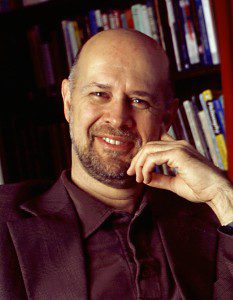Jerry Walls is always doing or saying something unexpected. In some, this is a mere eccentricity, but in Walls it is the fecundity of a restless first-rate intellect. He is so reasonable, but not in a grinding way, in a passionate way. Jerry Walls loves to think and so he leaps into an argument and then argues carefully. He says of himself: “There is no sense ignoring the elephant in the room something I am seldom disposed to do anyway.” This is true. Walls is more likely to bring an elephant to a party than to avoid seeing and naming one.

The combination is exciting. He will say an outrageous thing, make me think an unexpected thought, and then show how sensible it all is.
Walls Outrageous Idea
Walls is as Protestant as Billy Graham, but wishes all of us to consider the existence of Purgatory. He believes it is an intellectual necessity given other things he believes as a Protestant. He is willing to follow his own ideas to a “Catholic” conclusion and accepts the logic without seeing the need to give the Catholics all the good ideas.
Walls thinks Purgatory is one of those good ideas that can be reclaimed by Protestants. As a fellow who has served as his provost for three years, I can say that this is vintage Walls. He follows the argument where it leads even if it appears monstrous. At first hearing, Walls sounds like he has jumped out of Protestantism. Purgatory is his latest monstrous idea he will tame with gentle, Wesleyan logic.
Like any good monster movie, however, he puts off showing us the Monster Idea until fairly late in the book. First, Walls sets the stage by arguing for the Christian ideas of Heaven and Hell. The book would be worth buying if only for this introduction (and it is very brief) to an area where Walls has done much serious intellectual work. He has provided his own summary to that work and like all summaries, it should be illuminating to those who write on Walls later. His omissions and additions to his own concepts are interesting to watch.
Walls makes me (at least) want to go to Heaven and wish to avoid Hell. This is good writing!
The key to Walls’ philosophy and theology is love. Walls is driven by love and pleasure to seek God. He wants to flourish as a human, so he chooses Christianity. Reading Walls is like reading a twenty-first century appropriation of Platonic imagery in the service of Biblical Christianity. This places Walls firmly in the camp of Christian thinkers such as AE Taylor, CS Lewis, and JRR Tolkien.
Walls argues that God’s love implies a Heaven far more interesting than most Christians understand. All pleasures will find their full expression there. At the same time, Walls knows that human free will demands the right to eternal damnation. Nobody should choose Hell, but you can if you wish. Walls has thought deeply enough to see that Rob Bell (Oprah’s favorite pastor) is wrong: Hell must be eternal. But Walls does not rest with an intellectual victory over Bell . . . he defends the doctrine of Hell against the best critics Marilyn Adams and Thomas Talbott. This awareness is what separates a good work of apologetics from the hackery that fills the “apologetics” section of Amazon.
Another virtue in Walls is that he argues from Scripture without proof texting. This can frustrate some readers who do not understand that some ideas have logical implications. If the primary characteristic of God is love and love exists as described in the Bible, this logically implies other truths. Walls teases out these “other truths.”
If the Bible says damnation is eternal, then this implies certain other ideas. For example, the Bible does not have to say that nobody leaves Hell, because the first statement demands this second idea. As a result, a bad reviewer might worry about the paucity of Scripture quoting in Walls, but this is because Walls begins with Revelation and teases out the implications.
On Purgatory
Why does Walls think the Christian doctrine of Heaven and Hell imply Purgatory?
First, Walls must clear some misconceptions. An endorsement of the idea of Purgatory need not be an endorsement of the Roman Catholic version of that idea. Nobody should or does defend the hucksterism that offered time-off from purgatory for cash gifts to the church . . . except maybe our contemporary television evangelists.
Second, Walls makes the obvious point that every Christian believes in “purgation” at death. Almost all Christians die with sin problems. No sinner is in Heaven. As a result, glorification in Heaven must involve purgation of sin. The question is not whether purgation occurs, but whether there is a place or time called Purgatory.
Walls writes that this division is not over purgation, but over the speed of the purging: Protestants tend to think sanctification comes instantly, Catholics and Orthodox over time with the use of the human free will. Walls rejects any purgation that is a satisfaction to God for our sin, but accepts that it is a cleansing (or sanctification for our sin. In this way, he accepts the Reformation (and Orthodox) idea that we cannot give satisfaction to God. Salvation is by grace through faith.
Walls’ book is a popular commentary on John Wesley and CS Lewis. He uses Lewis to get at Wesley. If you are a Calvinist, you will find Walls’ book rough going. You will think he has ignored your doctrines, because he has. Reformed friends be restless, Jerry Walls is no friend of Calvinism.
Walls is at his most effective when he pictures Purgatory as a completion of sanctification. He shows how we are changed by choices and those choices take place sequentially (at least in our experience). We would not be who we are if our sins were just zapped away. Our sins are forgiven immediately, but then we stand simultaneously a saint and a sinner. Purgatory is love’s answer: a place to change.
Purgatory: I don’t know. My own church rejects what they understand the Roman doctrine of Purgatory to be. Many of our leaders (Fathers and Mothers of the Faith) have suggested ideas like purgation. All this is to say I have no “bias” in this discussion and I came to the book with an open mind.
A Commendation and a Worry
Against such philosophers as Notre Dame’s Peter van Inwagen, Walls is a dualist. He asserts there is a soul and that it can exist apart from the physical body. By itself, this is refreshing as it embraces the position held by almost all in theologians historically and fits the natural reading of Scripture.
I am worried about Walls’ ontology of humanity. He need not consult a doctor, I mean by this a worry that Walls views humans after death as capable of certain kinds of change. Why not view humanity as “fixed” in certain dispositions? This would explain why people cannot “leave” Hell, an idea that obviously still troubles Walls.
This is particularly relevant since Walls bases part of his argument for Purgatory on ideas about human existence. For example, generally humans believe they continue to exist, despite all changes to their body, because of continuity. Purgatory allows continuity between death and the final Resurrection. Second, using the example of Scrooge, Walls shows that people change over time.
And this is the problem. I am not persuaded that humans have time after death. Rather, I embrace a view more like that of Boethius that God is “outside of time” and redeemed humanity might be so as well.* Glorification would be (on this view) instant because all things happen “now.” There is only “now.” Walls does not deal with this traditional Christian idea at all.
A Commendation (with a Warning)

Apologetics is a field fraught with fraud. I have known people who had ghost writers do most of “their” work, made up archaeological finds, inflated or made up degrees, or ran apologetics fronts that were “cash cows” they milked. It is a relief to read Walls, an academic’s academic. He has serious publications in the fields he popularizes. He studied at Notre Dame with the world’s greatest living Christian philosopher: Alvin Plantinga. He did not just visit the library, take a summer class, stay some time in South Bend and grab a snap with Al. He did the grueling work there. He is for real.
Jerry Walls is a serious thinker, philosopher, and defender of the Faith.
If this book is breezy, it is because he has done the hard work to justify his generalizations elsewhere. Walls, like Nancy Pearcey, works hard. He reads the material, wrestles with it, and comes to conclusions. He does not hire ghostwriters or summarize the work of other people. He is an actual thinker, a real apologist.
Here is a rule of thumb: If an “apologist” does not read the primary source documents himself, he is a fraud. I can testify that Jerry Walls is no fraud. Thank God I have been able to review two good books in a row! The field of apologetics is not always so kind to the reviewer!
Walls is not a coldblooded Vulcanian: he is a man who weeps at Les Miserables. He is a philosopher . . . and that means a lover of wisdom. It is a pleasure to serve with him.
Walls has half persuaded me about Purgatory and that surprised me. His logic is fierce and it was a pleasure to follow. Buy the book.
*Google Stump and Kretzmann for best defense of Divine Timelessness.











